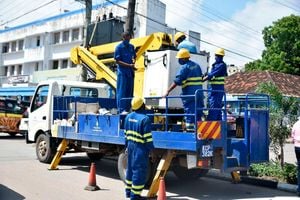
The cost of power in Kenya has been made expensive because the power provider buys power expensively from 19 Independent Power Producers (IPPs).
Kenya will establish a new office to negotiate and sign agreements between Kenya Power and Independent Power Producers (IPPs) in the latest push to reduce the lengthy period it takes to sign new Power Purchase Agreements (PPAs).
The National Assembly Departmental Committee on Energy made the recommendation to the Parliament, saying that the creation of an IPP-dedicated office would end the delays and shorten processes currently involved in signing the power purchase deals.
Currently, the Treasury through the Public Private Partnerships directorate negotiates the terms and conditions of PPAs like pricing mechanisms, tariff structures and payment schedules.
The Energy and Petroleum Regulatory Authority and Kenya Power are also involved in the process, leading to delays that run into a year before a deal is inked.
“Upon adoption of this Report, the Ministry of Energy and Petroleum in conjunction with the National Treasury fast-track the formation and operationalization of an independent IPP Office modelled similar to South Africa's IPP Office,” the committee says in the report tabled before the House for debate and adoption.
South Africa's IPP office is tasked with providing advisory services related to onboarding IPPs.
IPPs at times take extended periods to secure financial closes upon sealing of the PPAs, further extending the time needed to bring a fresh supply of electricity to the grid.
“This (creation of the IPP office) would help address the bureaucracies and delays witnessed in signing and formalizing PPAs by having a one-stop shop for IPPs, " added the committee.
Besides the lengthy bureaucratic process involved in signing new PPAs, Kenya is also faced with a surge in electricity demand which has significantly cut the reserve margin— the amount of extra electricity generation capacity that is available above demand.
Kenya recorded a fresh peak demand —the time at which electricity demand is highest— of 2,239 Megawatts (MW) on August 21 this year, with Energy CS Opiyo Wandayi saying that this (new peak) forced Kenya Power to load shed 6 MW.
The reserve margin was 9 MW against the system requirement of 310 MW. A dwindling electricity reserve significantly exposes the economy to the possibility of increased blackouts whenever demand surges.
The creation of an IPP-dedicated office, to mirror similar practices in South Africa comes at a time of growing calls from Kenya Power and the Ministry of Energy for the lifting of a moratorium that was placed on new PPAs last year in a bid to avert a possible generation deficit.
Besides the lengthy process, experts have said that the PPAs are lopsided and favour IPPs while exposing consumers in the form of high bills.
The experts have called on the relevant agencies involved in PPA negotiation to pursue deals that do not disadvantage consumers.
Mr Wandayi and Kenya Power Managing Director Joseph Siror recently called on Parliament to lift the moratorium on new PPAs in a bid to avoid plunging the country into an electricity generation crisis.
The duo said that the fast-growing demand for electricity has necessitated fresh PPAs that will, besides bolstering supply to the national grid, also ensure affordable electricity.












